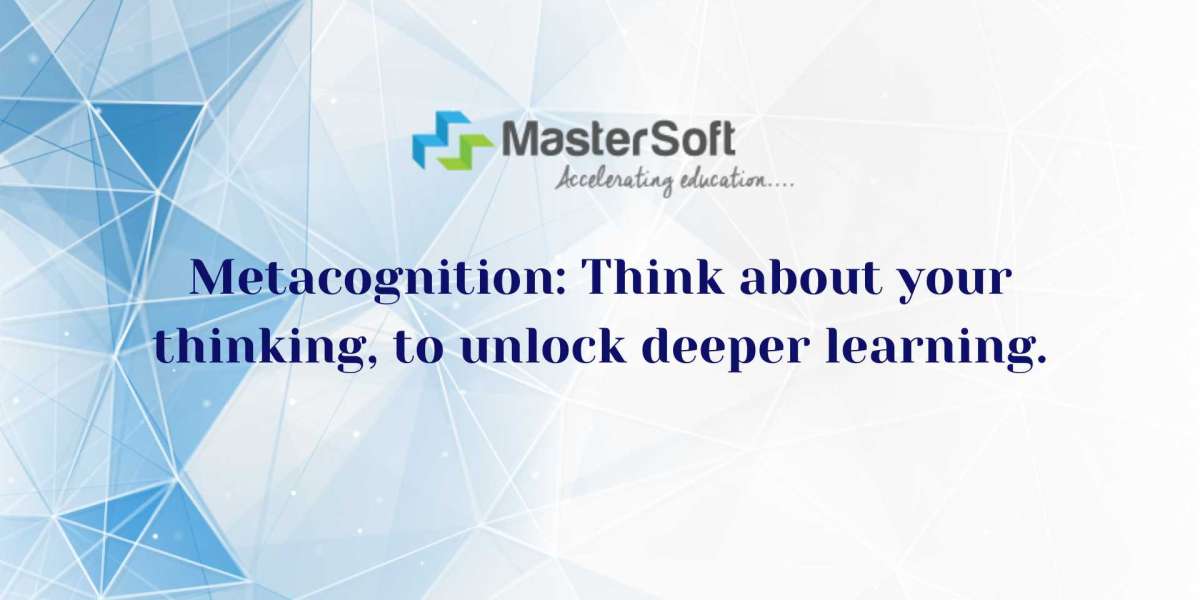In our fast-paced world, understanding how we think and learn can provide a significant edge in both personal and professional life. This brings us to the concept of metacognition, often described as "thinking about thinking." While it may sound abstract, metacognition involves practical strategies for self-awareness and control over one's cognitive processes. This blog explores what metacognition is, its importance, and how beginners can harness its power to enhance their learning and problem-solving abilities.
1. What Is Metacognition?
At its core, metacognition refers to the awareness and management of one’s own thought processes. It encompasses two main components: metacognitive knowledge and metacognitive regulation. Metacognitive knowledge involves understanding one's cognitive abilities and strategies, while metacognitive regulation refers to monitoring and controlling these cognitive activities. In simple terms, metacognition allows individuals to reflect on how they learn, recognize their strengths and weaknesses, and adapt their strategies to improve understanding and performance.
2. The Importance of Metacognition
Metacognition plays a crucial role in effective learning and problem-solving. It enables individuals to plan, monitor, and evaluate their learning strategies, leading to more efficient and effective learning. By understanding their cognitive processes, learners can identify what works best for them and make necessary adjustments. This self-awareness not only enhances academic performance but also fosters lifelong learning skills. In addition, metacognition aids in critical thinking, decision-making, and the ability to tackle complex problems by allowing individuals to approach challenges with a strategic mindset.
3. Developing Metacognitive Awareness
The first step towards mastering metacognition is developing metacognitive awareness. This involves recognizing when and how you think and learn. To cultivate this awareness, start by reflecting on your learning experiences. Ask yourself questions such as: How do I approach new information? What strategies do I use when I encounter difficulties? When do I feel most confident in my learning? Keeping a learning journal can be a practical way to document these reflections and track your cognitive patterns over time. Regular reflection builds a deeper understanding of your cognitive habits and helps in making informed adjustments.
4. Implementing Metacognitive Strategies
Once you have developed an awareness of your cognitive processes, the next step is to implement metacognitive strategies. These strategies are practical tools for planning, monitoring, and evaluating your learning. For example, before starting a task, set clear goals and plan your approach. During the task, periodically check your progress and make adjustments if necessary. After completing the task, evaluate your performance and reflect on what you learned and how you can improve. Techniques such as self-questioning, summarization, and concept mapping can also enhance your metacognitive skills by actively engaging with the material and reinforcing understanding.
5. Metacognition in Academic Learning
In an academic context, metacognition can significantly enhance study habits and academic performance. Effective metacognitive strategies include setting specific learning objectives, organizing study materials, and creating a study schedule. During study sessions, practice active learning techniques such as questioning, summarizing, and teaching the material to someone else. Use self-assessment tools to evaluate your understanding and identify areas where you need further review. Metacognitive skills also help in managing exam preparation by allowing you to identify which topics require more focus and which strategies best suit your learning style.
6. Metacognition in Problem-Solving
Metacognition is equally valuable in problem-solving scenarios. When faced with a problem, start by defining the problem clearly and identifying your goals. Develop a plan of action, considering different strategies and potential solutions. As you work through the problem, monitor your progress and be willing to adjust your approach if you encounter obstacles. After solving the problem, reflect on the process: What worked well? What could you have done differently? This reflective practice helps in refining your problem-solving skills and applying them more effectively in future situations.
7. Overcoming Metacognitive Challenges
While metacognition offers numerous benefits, it can also present challenges. Developing metacognitive skills requires practice and patience. Common obstacles include a lack of awareness of one's cognitive processes, difficulty in accurately self-assessing, and resistance to changing established habits. To overcome these challenges, start with small, manageable steps. Focus on one or two metacognitive strategies at a time and gradually incorporate them into your routine. Seek feedback from peers or mentors to gain an external perspective on your cognitive processes. Remember, metacognition is a skill that improves with practice and perseverance.
8. Incorporating Metacognition into Daily Life
Beyond academic and professional settings, metacognition can enhance everyday decision-making and personal growth. Apply metacognitive strategies to manage your daily tasks, set personal goals, and reflect on your experiences. For instance, when making decisions, consider your thought process and how different factors influence your choices. Use reflection to learn from your successes and mistakes, and apply these insights to future decisions. By incorporating metacognition into daily life, you can become more self-aware, adaptable, and effective in navigating various challenges and opportunities.
9. Tools and Resources for Enhancing Metacognition
Several tools and resources can support the development of metacognitive skills. Digital tools such as mind mapping software, learning apps, and reflective journals provide platforms for organizing thoughts and tracking cognitive processes. Online courses and workshops on metacognitive strategies offer structured guidance and practical exercises. Books and articles on metacognition provide deeper insights and examples of effective metacognitive practices. Leveraging these resources can enhance your understanding of metacognition and provide practical techniques for applying it in different contexts.
10. The Future of Metacognition
As the world continues to evolve, the importance of metacognition in education, work, and personal life is likely to grow. Advances in cognitive science and educational technology are expanding our understanding of metacognitive processes and how they can be nurtured. Future developments may include more sophisticated tools for monitoring and enhancing metacognitive skills, as well as integration into educational curricula and professional development programs. By staying informed about these trends and continuously refining your metacognitive skills, you can remain agile and effective in a rapidly changing world.
Conclusion
In conclusion, mastering metacognition empowers individuals to understand and control their cognitive processes, leading to more effective learning, problem-solving, and decision-making. By developing metacognitive awareness, implementing practical strategies, and incorporating these skills into various aspects of life, you can enhance your cognitive abilities and achieve greater success. Whether in academic, professional, or personal contexts, metacognition offers valuable insights and tools for navigating challenges and maximizing your potential. As you embark on your journey to master your mind, remember that metacognition is a lifelong skill that evolves and strengthens with practice and reflection. Embrace the process and unlock the full potential of your cognitive capabilities.








